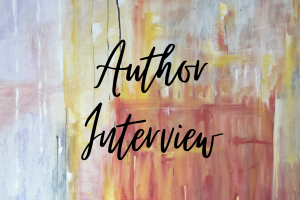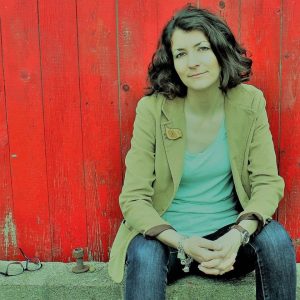Freedom in Writing: An Interview with Rebecca Cuthbert

Award-winning author Rebecca Cuthbert is one of the people I know, but I honestly can’t remember how or when our paths—literal or virtual—crossed! I think that’s the way it goes these days with social media and online writing communities. But how we met doesn’t matter. I’m thrilled to have her on the blog today because she’s a fascinating person, a talented author, and an outstanding literary citizen (her interview series is very informative). Rebecca writes poetry, fiction, and nonfiction, and her work has been featured in Blueline Magazine, Brevity, Slipstream, and Neworld Review, among others. She’s a member of the Horror Writers Association (I wish I had asked her a question about that!), a teacher, and an editor. She’s also a student, which means she has very little free time on her hands. I know how topsy-turvy the beginning of the semester can be for both students and faculty, so I’m especially grateful that Rebecca carved out some time for me and my questions.
Christina: Welcome to my author interview series! You write “speculative, slipstream, and dark fiction.” Slipstream is a term that some of our readers might not recognize. Can you tell us what that means? And how did you become interested in these genres? Do you feel that they can do something other genres cannot?
Rebecca: Yes! Slipstream is slippery—the subgenre and the definition. There is an “in-betweenness” to slipstream fiction—stories that include elements of two (or more) genres. But, often, it is used to describe fiction that has qualities or properties of both “literary fiction,” which is a weighted term, I know, often being associated with art and scholarly study, and “genre fiction,” which some people call “popular” or “commercial” fiction—all your fun stuff, like horror and romance and sci-fi. But all of the definitions can basically be thrown out, because “literary” fiction can be popular, and “genre” fiction can be literary.
I am “literary fiction trained,” in that I graduated from an MFA program at West Virginia University in 2011. While some instructors and fellow students liked speculative fiction, others didn’t, and I felt my “weird side” being crowded out in favor of more “serious literature” (again, weird can be serious!). Now, speculative fiction is accepted and celebrated in MFA programs, and I will admit I’m a little jealous.
But, and I’m grateful for this, at WVU I learned how to pay attention to words and sounds, diction and syntax, rhythms, cadences—the musicality of language. Before that, my prose, on a sentence level, was lacking. That is not to say other writers CAN’T acquire those things without an MFA program—I am just talking about myself and my own journey.
That’s all a long way of saying that my stories tend to have qualities of literary fiction and qualities of genres like horror, sci-fi, weird fiction, the uncanny, the grotesque, fairy tales (grimdark), etc. “Dark fiction” is another kind of catch-all term, but it works so well as a descriptor for my stories. If you want haunted pickup trucks, revenge murder via feral cats, and feminist horror time loops, I’m your gal. Sometimes there are happy endings, but even with those, it depends on perspective.
By not confining myself to one or two genres with set, expected parameters, I can do whatever I want in my stories, and I really love that freedom.
Christina: Much of your work involves short fiction. What is so compelling about the short story. How do you approach writing one? With respect to a short story collection—what challenges lie there?
Rebecca: I love the form of the short story. I fell in love with it during college, because in high school, we almost exclusively read novels. I keep coming back to the word “freedom,” and I’ll use it again here—I find that writing short stories gives me license to do whatever I want, and many of those ideas wouldn’t work in a longer form. Short stories work especially well with dark fiction and its associated genres, too. I can scare readers, or make them uncomfortable, uneasy, and then leave them with that fear/discomfort/tension. Like an echo or an aftertaste.
Right now, I am working on something longer, though—it’s shaping up to be a novella. Not sure that will ever see the light of day, but, it’s a new challenge for me.
I am currently in the “querying stage” with a short story collection I just finished—trying to find it a home with a publisher. I think the main issue with creating a collection is that you are trying to do two opposite things at once—you need your stories to be cohesive enough to share space in a single book, but you also need those stories to be different from each other, so the reader doesn’t get bored. They have to go together, but not be the same. I’m sure it’s the same for musicians creating albums. As you move forward in the process, though, this becomes easier than it sounds. You find the common threads, the common themes. In my collection, readers will (one day, I hope) see a lot of transformation, redemption, and revenge. There are reckonings the characters have to face, for better or for worse.
Christina: How do your past experiences inform your writing? What is the greatest lesson you hope to impart to a student or a writer?
Rebecca: I have found that all of my jobs, in the last 10 years or so, have revolved around words. I was an editor at Leapfrog Press for a long time—first acquisitions, then managing. I have taught creative writing classes for years at SUNY Fredonia (and still do). I spent two years as a reporter for the local newspaper. I have also freelanced quite a bit, writing feature articles, advertorials, and book reviews for various publications. Occasionally, I take Communication classes at SUNY Fredonia as a student, slowly working my way toward a second bachelor’s degree in Public Relations. And really, that’s all words, too.
What this has given me is the ability to write in multiple genres, and to learn about and understand the needs of different audiences. I think it’s given me a better command over things like voice and tone. It makes me feel like a word magician, like I can make words do whatever I want them to do. And I hope, in some small way, over the few weeks I spend with them each semester, to get my students to want to be able to do that, too. A lot of my energy as a writing teacher is spent getting students to try new things and work outside of their comfort zones. Some are really willing to do that, and others resist me for 16 weeks! Gotta respect their determination.
Christina: I love conducting interviews because I learn so much about other people when I’m researching them. One of the things that fascinated me about you are your blogs. Can you tell us a little bit about them and how they came to be?
Rebecca: My different interests and endeavors have a way of overlapping quite a bit. For one of the PR classes I took, I had to start a blog—on any topic. So, I started one about gardening, and more specifically, about being a gardener with more enthusiasm than skill, called “Dig, Bitch, Dig: The Swearing Blog with a Gardening Problem.” There, I write about different things happening in my yard and garden, projects I’ve done or want to do, problems I’m facing, etc. The blog needed a home, so became a little website, and that led to a Twitter account, and now I have gardening friends all over the world. Oh, and I got an A on it, for my class.
I have another blog focused on writing, which also includes guest posts from and interviews with other writers in various genres. That one is called “Writer’s Block & the Ticking Clock,” and it was created to be a supportive community space.
And, gardening and nature play a large role in many of my stories. “Six O’Clock House,” the title story of my collection manuscript Six O’Clock House & Other Strange Tales, is set at a greenhouse, where the protagonist works; “Inheritance” is set (mostly) at a farm; “Damp in the Walls” involves a creek and floodwaters; “Rest for the Wicked” takes place at a cabin in the woods. On and on. I’ve just submitted a sort-of slasher that happens at a flower shop.
Christina: Animals are always fair game for this series. Can you tell us a little bit about your menagerie? Do animals feature in your writing?
Rebecca: Like plants and books, I seem to acquire pets. I have Humphrey, a Russian Tortoise, who someone advertised on Facebook for $50. I scooped him up. He will outlive, me and I’ll have to put him in my will. Then there is Mildred, the cat, who came to us as a stray when my friend Amanda found her in a rainstorm trying to jump into people’s cars. My husband and I miss the dogs we’ve loved and lost, Tobi, Harvey, and Daisy, and in the last days of June, we adopted an old, overweight beagle named Athena, and we are obsessed with her. She’s on a diet and exercise program and doing great. I volunteer at an animal shelter, so the likelihood of us ever being pet-free is very skimpy.
And yep, animals definitely find their way into my stories. In my collection, there are: frogs, cats, chickens, a donkey, a cardinal, and a crayfish, if I’m remembering all of them.
Christina: And on that writing note—what can we expect from you soon?
Rebecca: I have really been hustling lately. Whether or not it pays off remains to be seen. I’m shopping the collection around, but also working on additional stories and poems and the odd essay or two. I submit work to journals, anthologies, and/or podcasts almost every week. I must have about 30 submissions out right now. Most recently, I got a speculative poem, “Still Love,” accepted by Nocturne Magazine, a horror publication (out in October), and a story, “Falling to Pieces,” accepted by Defunkt Magazine (out soon!). Oh! And Black Hare Press accepted two of my drabbles for a Halloween-themed anthology. I have gotten some hopeful news about a couple of other submissions, but I don’t want to jinx it by running my mouth.
Aside from the novella-in-progress, called Forgive Us Our Trespasses (a gothic/romantic/murder/mystery tale), my brain is rolling around a novel series that involves a bit of good old-fashioned cannibalism.

Rebecca can be found in multiple places!
Website: https://rebeccacuthbert.com/
Twitter: @RebeccaJCuth
Thanks to Rebecca for agreeing to this interview! If you know of an author who’d like to be featured in an interview (or you are an author who would like to be featured), feel free to leave a comment or email me via my contact page.

Fascinating interview! Good luck on all of your endeavors! You are a creative powerhouse.
Rebecca sure is, isn’t she? Thank you so much for reading!